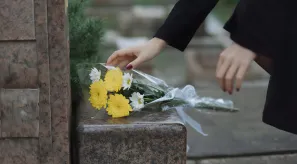The death of a family member abroad is an emotionally difficult situation for families and can be further complicated at an administrative level if you are not clear about how to handle it. It is essential to carry out the necessary administrative procedures quickly and effectively in order to make the experience as stress-free as possible. For this reason, we have prepared a brief step-by-step guide on how to proceed should someone close to you dies abroad.
First steps to take after the death of someone abroad
It is vital to know the first steps to be carried out to repatriate someone who has died abroad. It will enable you to start the process and facilitate the rest of the steps that will follow.
Contact the embassy or consulate
The first step after the death of a loved one abroad is to contact the embassy or consulate of the deceased's country of origin. These institutions can provide assistance and guidance on the necessary legal and administrative procedures.
Through them it is possible to obtain a local death certificate, which is necessary for all subsequent procedures. They can also provide official support in repatriating the body or remains, as well as help in coordinating with local authorities to ensure that all steps are carried out properly.
Notify local authorities
Local authorities in the country where the death occurred should also be contacted. It is best to inform both the local police in the area and the civil registry office in the country where the death occurred. These are the bodies that will issue the death certificate which is necessary for all further steps to be taken.
This document must be in the local language, and may need to be officially translated into the language of the deceased's country of origin.
Inform family and friends
After contacting the local authorities and the embassy where the death occurred, it is important to inform the family and friends of the deceased. This is an incredibly difficult step on an emotional level, but it is essential for all those close to the deceased to be aware of the situation and to be able to offer or receive support.
If you are wondering what happens if a foreigner dies in another country, for example here in Spain, the procedures will be practically the same as in all other cases.
Required documents and legal procedures
In order to ensure that the whole process is as quick and efficient as possible, repatriating a person who has died abroad requires a number of basic legal documents to be obtained and procedures to be carried out.
Death certificate
The death certificate, as stated above, is the first document to be issued by the local authorities in the country where the death occurred. It should include details such as the name, date, place and cause of death.
It is important to insist that several certified copies of this document are provided, as they will be used for numerous administrative procedures, including the repatriation of the deceased person.
As we have already mentioned, it may be necessary to translate the certificate and authenticate it by the Ministry of Foreign Affairs of the country where the death occurred.
Passport and identity card of the deceased person
The passport and any other identity document of the deceased, such as an ID card or driver's licence, must be provided for the repatriation arrangements. These documents are essential both to confirm the identity of the deceased and to arrange for the passport to be cancelled.
It is therefore advisable to contact the relevant embassy or consulate to obtain guidance on the steps to follow for cancellation, as well as to carry out any other steps related to the deceased person's identity documents.
Permits and authorisation for the transfer of ashes
If the deceased was cremated and the ashes need to transferred, these additional documents need to be obtained:
- Cremation certificate.
- Transfer permit.
- Letter from the funeral home confirming that the ashes present no health risk.
It is also important to contact the airline to ensure that you meet their specific requirements for the transport of ashes, as some countries and airlines have very strict regulations when it comes to travelling with ashes.
Additional documentation depending on which country the death occurred
Additional documentary requirements can vary depending on the country where the death happened.
For example, some countries require a health declaration confirming that the death was not caused by a contagious disease, while others may require permission from the local authorities for the transfer of the body or ashes.
Given this, it is very important to consult with the consulate of the country of origin and with the local funeral home that is taking care of the deceased person to ensure that all the specific requirements of the country in which the death occurred are met.
Options for repatriation of the body or ashes
In the event of a death abroad, there are two main options: the transfer of the body or the cremation and subsequent transfer of the ashes. The choice will depend on the preferences of the family members and the express wishes of the deceased, should they have expressed them before their death.
Transfer of the body
The transfer of the body involves transporting the deceased from the country of death to their country of origin. This process requires obtaining several documents including a death certificate, an embalming certificate and transfer permits.
If the country of origin is Spain, in order to proceed with the funeral, it is necessary to notify the local authorities once the deceased has arrived and also to obtain a certificate confirming that an autopsy is not required. Be sure to choose a funeral home in Spain that will facilitate all these arrangements and take care of coordinating all the transport logistics.
Cremation and transfer of the ashes
Cremation and the transfer of ashes is a simpler and more economical option. The process involves cremating the body in the country where the death occurred and then sending the ashes to the country of origin through a certified and professional transfer of ashes service.
To be able to do this, it is necessary to have the death certificate, the cremation certificate and, in some cases, a special permit for the transport of ash. It is also possible to request leave days for the death of a family member abroad and accompany the urn back home, as the ashes can be transported as hand luggage on most airlines. However, it is best to make a specific enquiry with the airline you are travelling with. On arrival in Spain, it will then be necessary to complete the corresponding customs forms.
All of this information will help you to ensure that the repatriation of your loved one goes smoothly, allowing your family to focus on the grieving process without any additional worries.



